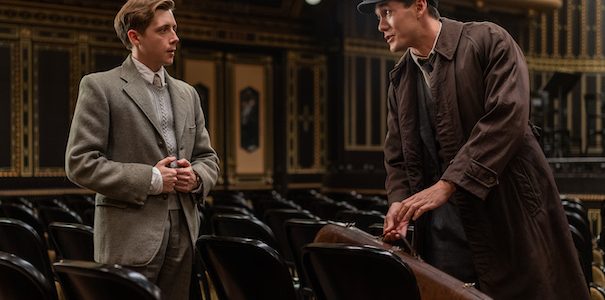
ReelBob: ‘The Song of Names’ ★★
By Bob Bloom
“The Song of Names” offers an intriguing premise that is undercut by its convoluted presentation.
The movie starts in London in 1951, flashes back to 1939 and forward to 1986, with various stops in between.
It’s a movie about the healing power of music, the bonds of brotherhood, the devastation of loss and faith — lost and rediscovered — all told against a backdrop of an odyssey that journeys from London to Warsaw to New York and back to London.
On the cusp of World War II, Dovidl Eli Rapaport, a Polish child violin prodigy, is left by his father to be cared for by the family of music promoter Gilbert Simmonds, whose son, Martin, is about Dovidl’s age.
At first, Martin is resentful about sharing his room with Dovidl, but as the years pass, a friendship and strong bond grows between them.
On the night in 1951 that Dovidl is scheduled to make his professional debut, he disappears.
Thirty-five years later, Martin, now a music promoter, is a judge at a competition, where he sees a young violinist who reminds him of Dovidl.
After questioning the youth, Martin begins a search to find his friend, along the way meeting people who knew and were touched by Dovidl.
The mystery surrounding Dovidl’s disappearance should be the most compelling aspect of the film, but director François Girard’s approach is so clinical and unemotional that it dilutes the urgency of Martin’s mission.
The title, “The Song of Names,” is derived from a prayer Dovidl hears that commemorates Holocaust victims. The movie, unlike a great symphony, fails to reach any crescendos. It neither soars nor emotionally involves you.
Once the movie’s major mystery is solved, its momentum dies. Like air leaking from a balloon, the film slowly becomes inert.
And that’s too bad because it negates the sharp work of three sets of performers — Luke Doyle and Misha Handley as young Dovidl and Martin; Jonah Hauer-King and Gerran Howell who portray Dovidl and Martin as young men; and Tim Roth and Clive Owen as Martin and Dovidl in their 50s.
It’s not a spoiler to reveal that the two childhood friends are reunited; it is Dovidl’s reasons for his actions that play like a plot contrivance.
His explanation is tied to the Holocaust and his rejection — and later again embracing his Jewish heritage and roots.
It plays in such a casual manner that it seems to diminish that horrific event, using it simply as a device to push along the storyline.
“The Song of Names” is not a bad movie; it is merely too artificial and bloodless.
It is a feature with the potential to warm your heart and make you weep, instead it leaves you cold and tempts you to yawn.
I am a founding member of the Indiana Film Journalists Association. My reviews appear at ReelBob (reelbob.com) and Rottentomatoes (www.rottentomatoes.com). I also review Blu-rays and DVDs. I can be reached by email at bobbloomjc@gmail.com or on Twitter @ReelBobBloom. Links to my reviews can be found on Facebook, Twitter and LinkedIn.
THE SONG OF NAMES
2 stars out of 4
PG-13, strong language, thematic elements, sexual references, smoking